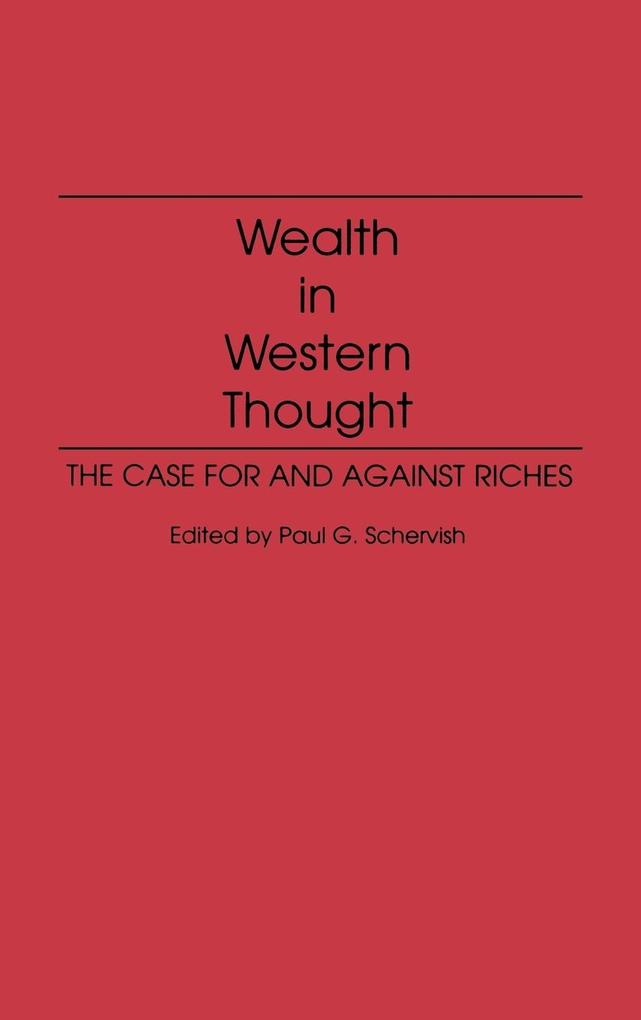
Zustellung: Do, 10.07. - Mo, 14.07.
Versand in 7 Tagen
VersandkostenfreiBased on roundtable discussions by a variety of scholars over a two-year period, these essays explore the complex and often contradictory matrix of sentiments, feelings, and beliefs that frame America's contemporary social doctrine of wealth. The seven Boston College faculty members whose writings comprise this volume are professors of classics, economics, ethics, history, literature, scripture, and sociology. Each scholar reviews a a range of writings and narratives that enunciate definite theses about the genesis and prospects as well as the uses and abuses of wealth. Today, as the discussion of wealth creation and distribution become framed less frequently under the rubrics of capitalism and socialism, it is propitious to examine other pieces of the debate that come to us from our Western classical, biblical, literary, and ethical traditions. The talk for and against wealth, so well articulated by Adam Smith and Karl Marx, is only one axis on which this important Western motif turns. Schervish and his contributors enable us to consult several other texts that can guide our repositioning on the controversies surrounding the moral status of wealth and the wealthy.
Inhaltsverzeichnis
Preface
Introduction by Paul G. Schervish
Anti-Popular Rhetoric in Ancient Greece by David H. Gill, S. J.
Does the New Testament Have an Economic Message? by Pheme Perkins
Tracing a Genealogy of "Talent": The Descent of Matthew 25: 14-30 into Contemporary Philanthropical Discourse by Dayton Haskin
Capitalism and Wealth Creation by Joseph F. Quinn
In Another Time: Statements of American Reformers Regarding Wealth and Privilege by Carol Morris Petillo
The Moral Biographies of the Wealthy and the Cultural Scripture of Wealth by Paul G. Schervish
Scripture, Moral Community, and Social Criticism by Lisa Sowle Cahill
Afterword by Paul G. Schervish
Selected Bibliography
Index
Introduction by Paul G. Schervish
Anti-Popular Rhetoric in Ancient Greece by David H. Gill, S. J.
Does the New Testament Have an Economic Message? by Pheme Perkins
Tracing a Genealogy of "Talent": The Descent of Matthew 25: 14-30 into Contemporary Philanthropical Discourse by Dayton Haskin
Capitalism and Wealth Creation by Joseph F. Quinn
In Another Time: Statements of American Reformers Regarding Wealth and Privilege by Carol Morris Petillo
The Moral Biographies of the Wealthy and the Cultural Scripture of Wealth by Paul G. Schervish
Scripture, Moral Community, and Social Criticism by Lisa Sowle Cahill
Afterword by Paul G. Schervish
Selected Bibliography
Index
Produktdetails
Erscheinungsdatum
30. Mai 1994
Sprache
englisch
Seitenanzahl
274
Autor/Autorin
Paul G. Schervish, Nancy Stave Campbell
Herausgegeben von
Paul G. Schervish
Verlag/Hersteller
Produktart
gebunden
Gewicht
600 g
Größe (L/B/H)
235/157/21 mm
ISBN
9780275946777
Entdecken Sie mehr
Bewertungen
0 Bewertungen
Es wurden noch keine Bewertungen abgegeben. Schreiben Sie die erste Bewertung zu "Wealth in Western Thought" und helfen Sie damit anderen bei der Kaufentscheidung.







